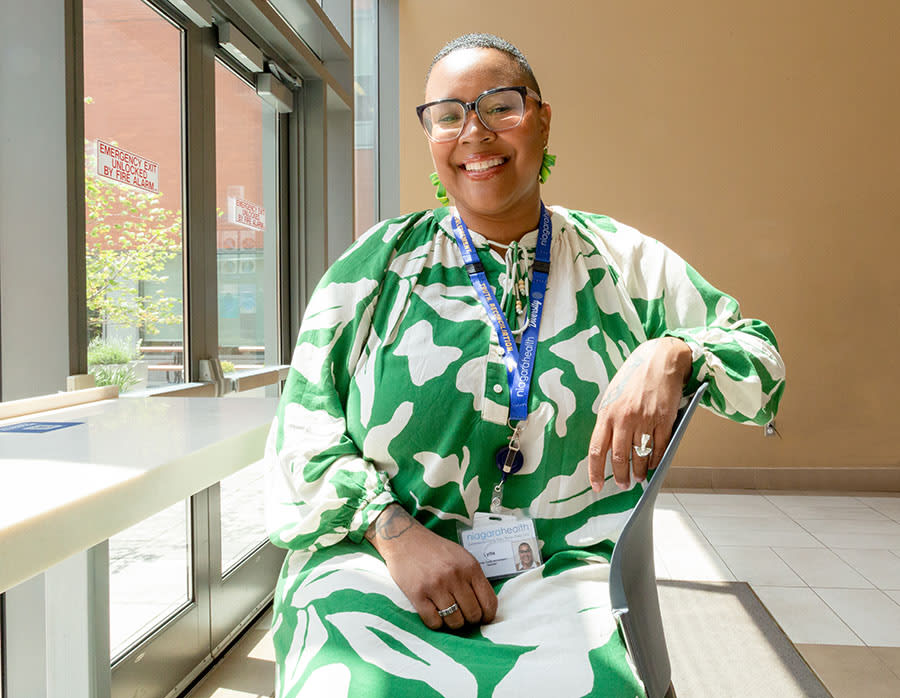We are Niagara Health is a series of stories that celebrates the incredible people working and volunteering in our organization and how they make a difference in the lives of patients and coworkers every day.

Lydia Collins is Niagara Health's new Diversity, Equity and Inclusion Specialist. Collins has spent her career uplifting marginalized voices, something she will continue to do as Niagara Health celebrates Pride.
Lydia Collins had many questions growing up.
The problem was, she didn’t feel there was anyone she could safely ask and who had answers for her.
They were questions about anti-racism and sexual health, for example. Later, an inquisitive Collins wondered about decolonization and sexual health. So Collins became her own sage, and learned how to find – and share – the answers she sought.
As Niagara Health’s new Diversity, Equity and Inclusion Specialist, she also hopes to answer questions for others who have them and aren’t sure where to turn.
“At Niagara Health, we probably see the most people in the region, considering how many people come into the hospital,” Collins says. “The opportunity is great to talk about diversity, equity and inclusion with staff so that it trickles down for patient outcomes. That’s really exciting for me.”
It took many questions and experiences to get here, however.
Having grown up in St. Catharines, Collins recalls a community that wasn’t as diverse as it is today. Gaps were apparent to a “younger Lydia” when it came to anti-racist frameworks that allowed for equity in healthcare, community health and sexual health.
Collins, who is queer, began filling in those gaps as a student at Brock University where she majored in English, minored in gender studies, and joined student groups that used intersectional, inclusive, and holistic approaches to teach about body autonomy and consent. English allowed her to use writing as an advocacy and education tool to explore those issues, especially sexual health, which has been a lifelong interest.
“This was a need to answer the questions that I had growing up and having no one to answer them for me,” Collins explains.
After university, she continued learning and equipping others with knowledge, working in HIV/AIDS prevention for the African, Caribbean and Black communities at an Ottawa community health centre and, later, at a province-wide organization. All the while, she continued writing to reach a wider audience.
It’s how we care for diverse trans and queer folks in healthcare. It’s about understanding the health challenges those communities are more susceptible to, due to intersectionality, and the social determinants of health.
Finding her niche and developing that expertise led to Collins moving from behind the computer screen to the front of the room to speak at sexual health and DEI workshops throughout Canada and the U.S. Her audiences ranged from curious kindergarten students to their teachers, university students, executives, non-profit leaders and everyone in between with hopes of imparting the importance of cultural humility.
“The way you see and understand things isn’t the same way everyone sees and understands things and that’s OK,” she says. “Having conversations around DEI isn’t meant to shame, it’s not meant to be defensive, but it’s a chance to reflect on what our barriers are, what our privileges are and using those privileges to uplift other groups and improve workplace culture, and culture in general.”
That’s something Collins has strived to do every day at Niagara Health since starting her role in late March.
“It’s understanding I’m queer but also cisgender, so what can I do to support trans folks, for example? Even though we’re part of the same (2SLGBTQIA+) umbrella, these folks experience challenges I’ll never face so what can I do to help? It’s learning how to stand up for trans folks when they’re not in the room.”
With June being Pride Month, an event rooted in the activism of Black and Latinx trans women, Collins is also using her privilege to remind people that the month celebrating the 2SLGBTQIA+ community is about “more than floats in a parade.” It’s about learning what else we can do to elevate marginalized voices.
This year’s theme at Niagara Health, Pride in Healthcare, is intended to help with that. Events throughout the month will highlight the beneficial impacts of positive healthcare experiences on members of the 2SLGTBQIA+ community and the importance of standing in solidarity with those who are two-spirit, lesbian, gay, bisexual, transgender, queer and/or questioning, intersex, asexual or identify in another affirmative way.
“It’s how we care for diverse trans and queer folks in healthcare,” Collins explains. “It’s about understanding the health challenges those communities are more susceptible to, due to intersectionality, and the social determinants of health. As healthcare workers, understanding that impacts health outcomes.
“It’s understanding that what was the best approach to healthcare 50 years ago is not the same today,” she adds. “That’s good. That’s part of learning and growing – it’s to have better outcomes.”
That bodes well for other young Lydias, seeking not only answers but the safety to ask the questions that inspired the positive actions defining Collins’ work today.
“If you bring the most marginalized groups to the table, every single person benefits,” Collins says. “Diversity is such a major asset to an organization. It offers different creative solutions to equity in healthcare. It’s being able to see the value in differences rather than a colour-blind approach that we’re all the same. The need for DEI is because of systemic issues. We were born into a system that already exists so what can we do to challenge things rather than say, ‘This is the way things have always been done.’”

